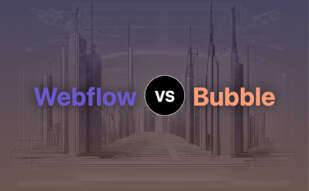Bubble is a cloud-based platform that allows non-technical users to build web applications without coding. Offering visual drag-and-drop builder capabilities, Bubble enables customization using HTML, CSS, and JavaScript. With features tailored for manufacturing, online sales, and e-commerce, Bubble integrates seamlessly with various tools and services, making it a versatile choice for a wide range of projects.

Looking beyond Bubble, individuals exploring other options can consider Webflow, Framer, Wix, Squarespace, WordPress, Elementor, Editor X, and Shopify as potential alternatives.
Webflow
Webflow is a robust eCommerce platform for creating websites without coding. Appreciated for its design-led brand representation by founder Jameel Mohammed, it offers tailored, end-to-end customer experiences. It caters to various products, be it physical or digital goods, or services while offering customization without the need for coding.
Webflow Top Features
- Customizable website creation: Enables designing attractive websites without the need for coding.
- Integrated payment processing: Accepts payments through Stripe, PayPal, Apple Pay, and Google Pay.
- Automated operations: Offers extensions for automated shipping processes, accounting, and notifications.
- SEO control: Supports meta title, description generation from product page names.
- Free tutorials: Webflow University offers comprehensive video tutorial classes on building online stores.
| Unique Features | Value |
|---|---|
| Interactive and animated design | Essential element for an engaging user experience. |
| QuickBooks compatibility | Ensures seamless accounting. |
| Comprehensive dashboard | Allows easy order and inventory management, refund issuance, etc. |
Webflow Downsides
- Transactional fees through Stripe might add to overall costs.
- No plugins required might limit functionality for some users.
- While it has broad functionalities, it might have a steeper learning curve for beginners.
Webflow Pricing
Webflow offers business-friendly pricing with packages starting at $29/mo when billed annually.
Webflow Use Cases
Use case 1: Web Designers
With its customizable, coding-free platform, Webflow proves to be a go-to tool for web designers, allowing for dynamic and compelling site creations.
Use case 2: Retail Businesses
Businesses selling physical or digital goods can leverage its eCommerce features, automated shipping processes, and efficient order management system.
Use case 3: Content Creators
Content creators can benefit from its built-in blogging feature, customized landing pages, and SEO control capabilities, attracting more visitors and enhancing engagement.
Framer
Meet Framer, a web design platform directed at bridging the gap between non-coders and aesthetic, responsive web design. Its trump card lies in its AI-assisted concept and drag-n-drop interface.
Framer Top Features
- AI-assisted concept: Offers a base version of design which users can freely modify.
- Drag-and-drop interface: Easy and intuitive design-building process.
- SEO optimization: Sites designed on Framer are optimized for speed and discoverability.
- Integration flexibility: Framer successfully integrates with popular design tools like Figma and Sketch.
- Design Components Marketplace: Access to a community of pre-made design components for users to draw inspiration and elements from.
| Extra Benefits | Availability |
| Custom code integration | Yes, offering flexibility and control over design details. |
| Unlimited viewers | Yes, for better team collaboration. |
| Enhanced security | Yes, specifically for business plan users. |
Framer Downsides
- CMS Support: Framer’s support system isn’t as extensive as Webflow’s or Bubble’s.
- E-commerce: The platform currently lacks native e-commerce features.
- Learning Curve: There’s a small learning curve for new users, albeit filled with growth and innovation.
Framer Pricing
Framer offers a variety of plans: The Mini Plan at $5/month, the Basic Plan at $15/month, the Pro Plan at $25/month, along with team pricing, and a custom Business plan. They also cater to light users with a limited-features free plan. Further, they offer custom domains at an additional cost.
Framer Use Cases
Use case 1
Framer suits startups well, as they can exploit its intuitive tools and cost-effective plans to build their web presence.
Use case 2
For freelancers, especially those with minimal coding knowledge, Framer’s AI-assist and drag-n-drop interface simplify the web design process.
Use case 3
With its unlimited viewers, team pricing, and advanced security, Framer holds significant advantages for large corporations aiming to streamline their design processes.
Wix
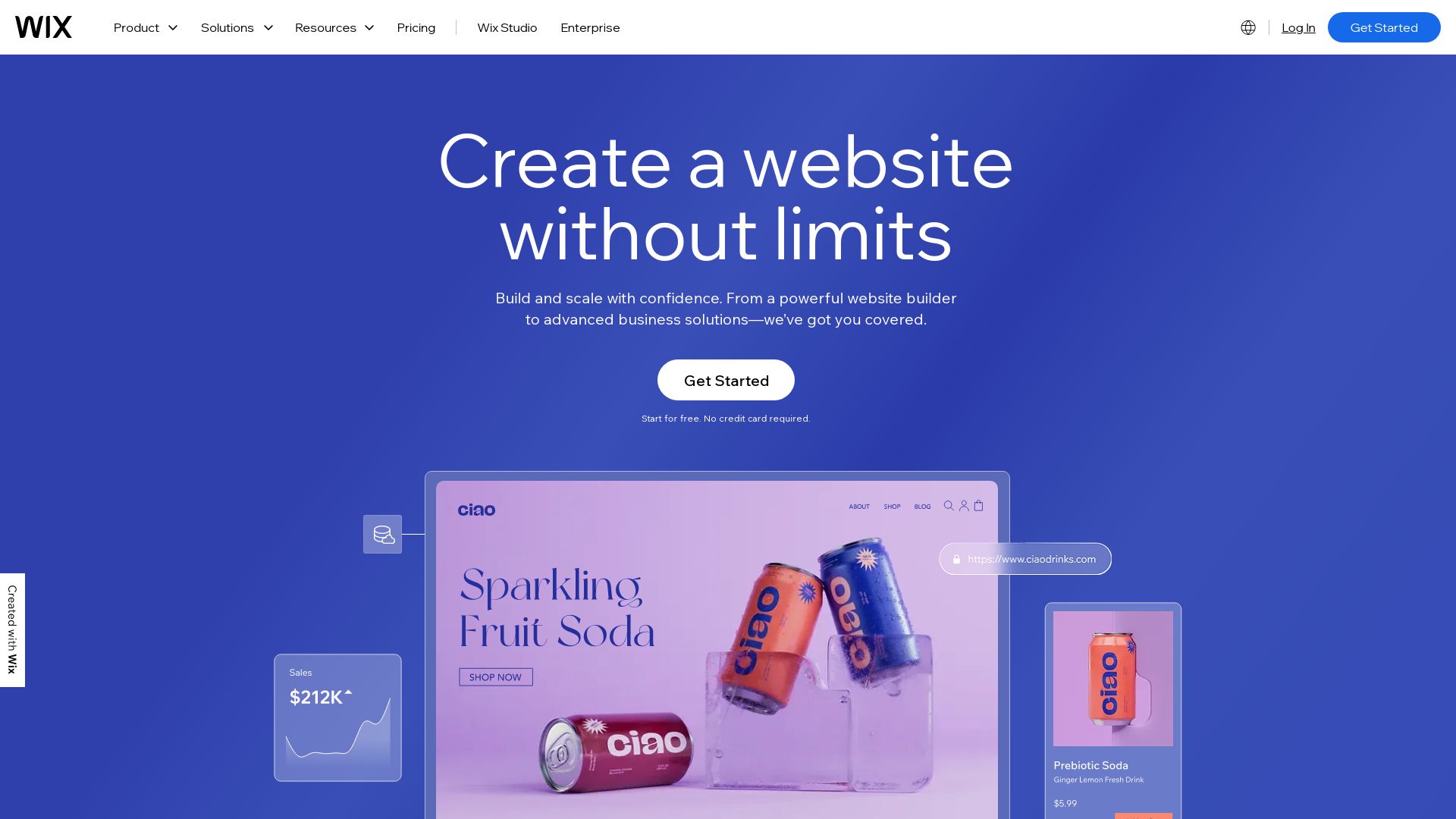
A beacon in the cosmos of eCommerce platform, Wix epitomizes digital prowess. With a constellation of services, from selling through websites, social media, and sales channels, to managing shipping, payments, and marketing, Wix is universal in its appeal.
Wix Top Features
- Intuitive eCommerce platform, lending a hand to businesses of all sizes and stages of growth
- Robust eCommerce infrastructure known for its speed, reliability, and security, capable of handling up to a staggering 750 transactions per second
- Offers a slew of 80+ payment solutions
- A vast selection of 500+ designer-made templates, to set your online presence apart
- Velo from Wix, your companion for rapid web app deployment
| Features | Benefit |
| SEO-friendly tools | Enhanced visibility in Search Engine Result Pages (SERPs) |
| Third-party apps via Wix App Market | Expanded functionality and integrations |
| Velo | Enhanced eCommerce functions |
Wix Limitations
- For businesses with a tremendously large product catalog, the limit of 50,000 items may be a constraint
- Some businesses may prefer a more traditional programming environment over Wix’s drag-and-drop editor
Wix Pricing
While exact pricing details are beyond the scope of this summary, rest assured, Wix offers a range of cost-effective plans and provides excellent value for money.
Wix Use Cases
Use case 1
For a startup taking its first steps in the digital world, Wix’s user-friendly, drag-and-drop website editor, along with industry-specific templates, makes the initiation process simpler.
Use case 2
Brick-and-mortar businesses venturing online will find the multichannel sales feature to be a boom, allowing them to seamlessly sell on platforms such as Amazon, eBay, Facebook, and Wish.
Use case 3
Existing online businesses with international customers will hail Wix’s cross-border selling capabilities, including localization features and support for international payment providers.
Squarespace
Squarespace is a versatile website builder platform with a focus on visually appealing, customizable templates, and a robust suite of ecommerce tools for your online store.
Top Squarespace Features
- Free trials allow you to test out the platform before committing.
- Squarespace Blueprint for personalizing elegant, designer-quality website templates.
- Integrated shopping cart, multiple payment gateways and support for both physical and digital products, allowing a seamless online selling experience.
- Squarespace Commerce provides a platform specifically built for online stores, without transaction limit and robust inventory management.
- Powerful analytic tools facilitate tracking visitor behaviour and sales.
| Feature | Description |
|---|---|
| SEO optimization | Better visibility on search engine results. |
| Mailchimp integration | Coordinate your email marketing efforts seamlessly. |
| Feature-rich blogging platform | Drive customer interest and engagement |
Squarespace Downsides
- Limited selection of apps in the Squarespace Extensions store.
- Customer support is limited to email, Twitter, and live chat.
- Shipping relies on third-party shipping carriers, which could affect shipping fees.
Squarespace Pricing
Note: Specific pricing for Squarespace was not provided in the company summary.
Squarespace Use Cases
Use case 1: Template Customization
Squarespace enables creatives looking to build visually stunning websites using the Squarespace Blueprint for customizing template designs.
Use case 2: E-commerce
Entrepreneurs and businesses can leverage the Squarespace Commerce platform to create, manage, and sell unlimited products with no transaction limit.
Use case 3: Data-Driven Decisions
Marketing teams can use Squarespace’s analytic tools to understand visitor behavior and track sales, guiding data-backed decision-making.
WordPress
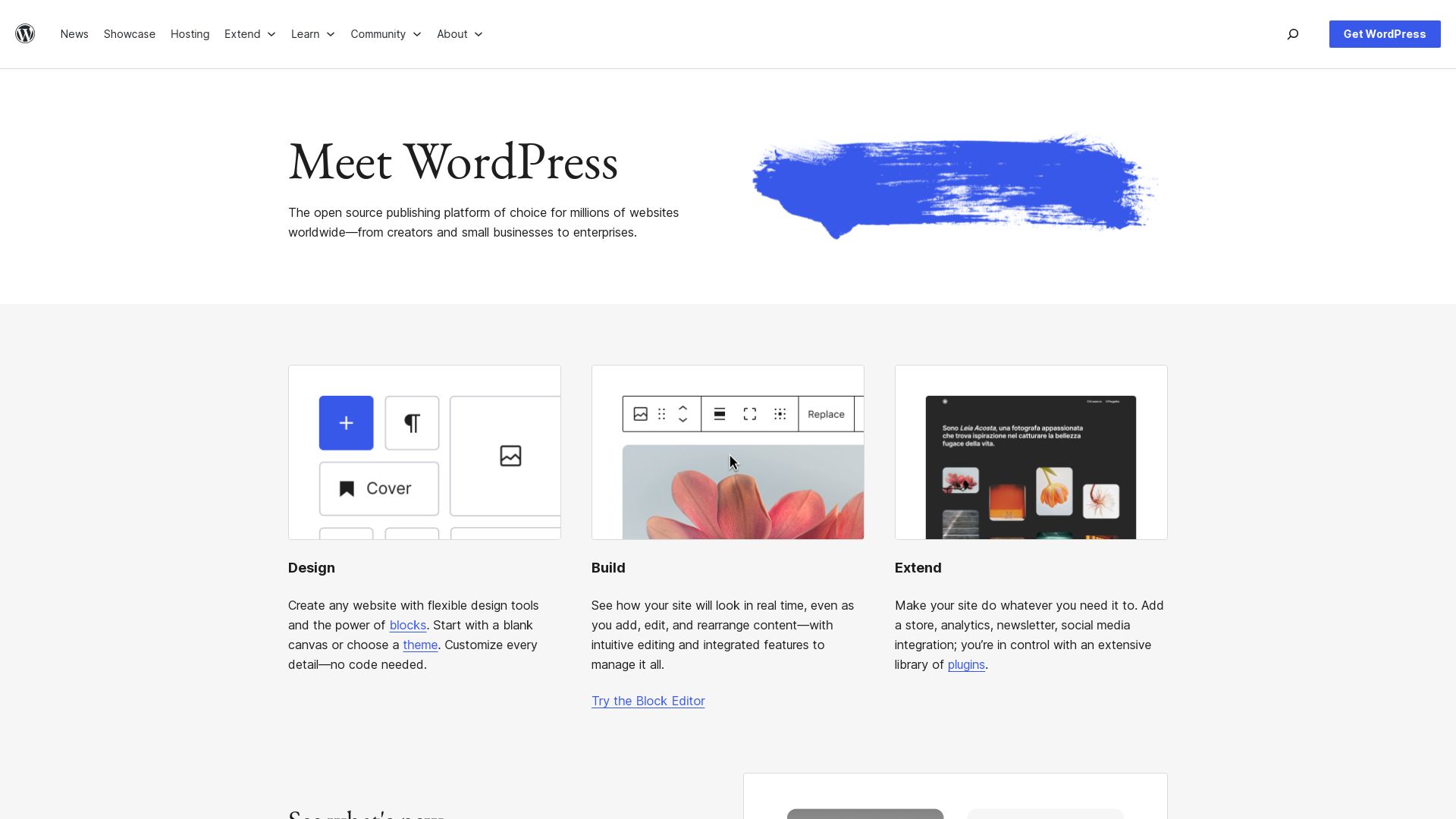
WordPress, boasting a 64% CMS market share, powers an impressive 40% of global websites inclusive of 70% which are supported by this platform specifically. Teetering on the frontier of web design and eCommerce, WordPress may present itself as a formidable alternative.
WordPress Top Features
- Remarkable Market Share: A testament to its efficiency, WordPress commands a 64% share in the CMS market.
- Wide Usage: Out of all global websites, 40% run on WordPress. This does not just represent small blogs or personal websites; the platform also supports 70% of business sites.
- WooCommerce Plugin: The WooCommerce plugin fuels over 30% of online stores, totalling more than five million live websites.
- Variety of Themes: Over 1,200 eCommerce-centered WordPress themes available for customization, offering vast design diversity.
| Premium Features | Included in established plans starting from an annual fee of $25,000, extending services like marketing automation, inventory management, and real-time shipping prices. |
| Regular Updates | Convenient automated updates and staging site for product testing ensures website relevancy and performance. |
| Site Security | High-performance DNS with SSL, alongside monitoring features, guarantees an ad-free and secure browsing experience for visitors. |
WordPress Limitations
- Not Primarily eCommerce: Not being a system primarily geared for eCommerce, some functionality might be missing or less efficient.
- Plugin Compatibility: Occasional plugin compatibility problems could arise when multiple plugins are in use.
WordPress Pricing
WordPress entails various costs. Essentials like domain registration, SSL, and other necessary services range from $15-$50 monthly. Additionally, custom design costs span between $1,000 and $10,000 and custom development costs start from $25,000. One should also budget for plugins and marketing costs ($250-$5000 per month), and an average hosting fee of $20 monthly.
WordPress Use Cases
Use Case 1: eCommerce Stores
WordPress excels as a platform for eCommerce. With the customizable and free WooCommerce plugin, online stores can create unique storefronts, optimize for search engines, and provide multiple payment options.
Use Case 2: Blogging
For personal blogging or content-focused sites, WordPress provides countless themes and plugins to customize the user experience.
Use Case 3: Business Websites
Businesses can use WordPress to develop a unique and professional online presence, with tools for SEO, security, and analytics integrated within the platform.
Elementor
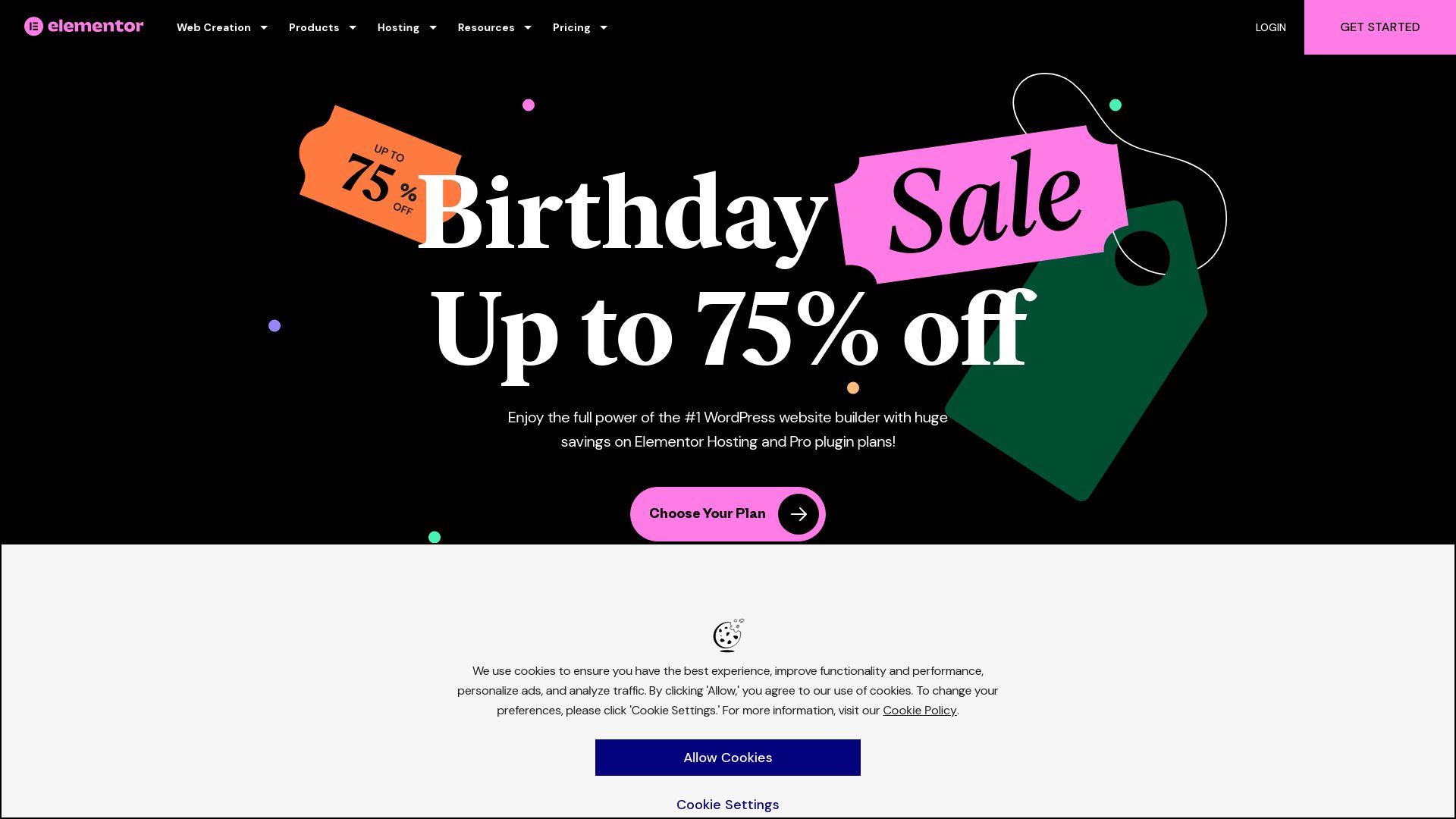
Elementor, an influential tool in the arena of web design, brings the dynamics of personalized and enhanced user experience into play, appealing to users’ preferences through functional cookies.
Elementor Top Features
- Rich customization possibilities facilitated by functional cookies, enabling personalized user experiences.
- Potent relevance in advertising, made possible by the use of targeting cookies.
- Assurance of seamless website functionality, underpinned by the use of strictly necessary cookies.
- Precise performance tracking to improve services, facilitated by performance cookies.
| Feature | Benefit |
|---|---|
| Functional cookies | Personalized user experience |
| Targeting cookies | Effective, relevant advertising |
| Strictly necessary cookies | High website functionality |
Elementor Limitations
- Dependence on cookies for user experience may be obstructive for users who prioritize privacy.
- The website’s functionality might be limited if strictly necessary cookies are indirectly blocked by user’s browser settings.
Elementor Pricing
As this inquiry does not provide details regarding Elementor’s pricing structure, it is advisable for interested parties to explore Elementor’s official website to gain comprehensive understanding.
Elementor Use Cases
Use case 1 – eCommerce
With its personalized user experience, Elementor can greatly enhance the layout of eCommerce websites, inevitably leading to better customer engagement.
Use case 2 – Digital Advertising
Elementor can be a potent tool for digital advertisers. Targeting cookies assist in placing relevant ads, which may result in increased conversion rates.
Use case 3 – Analytics
In the realm of data analytics, Elementor’s use of performance cookies can provide invaluable inputs about website visits and traffic sources, aiding in the formulation of strategic business decisions.
Editor X
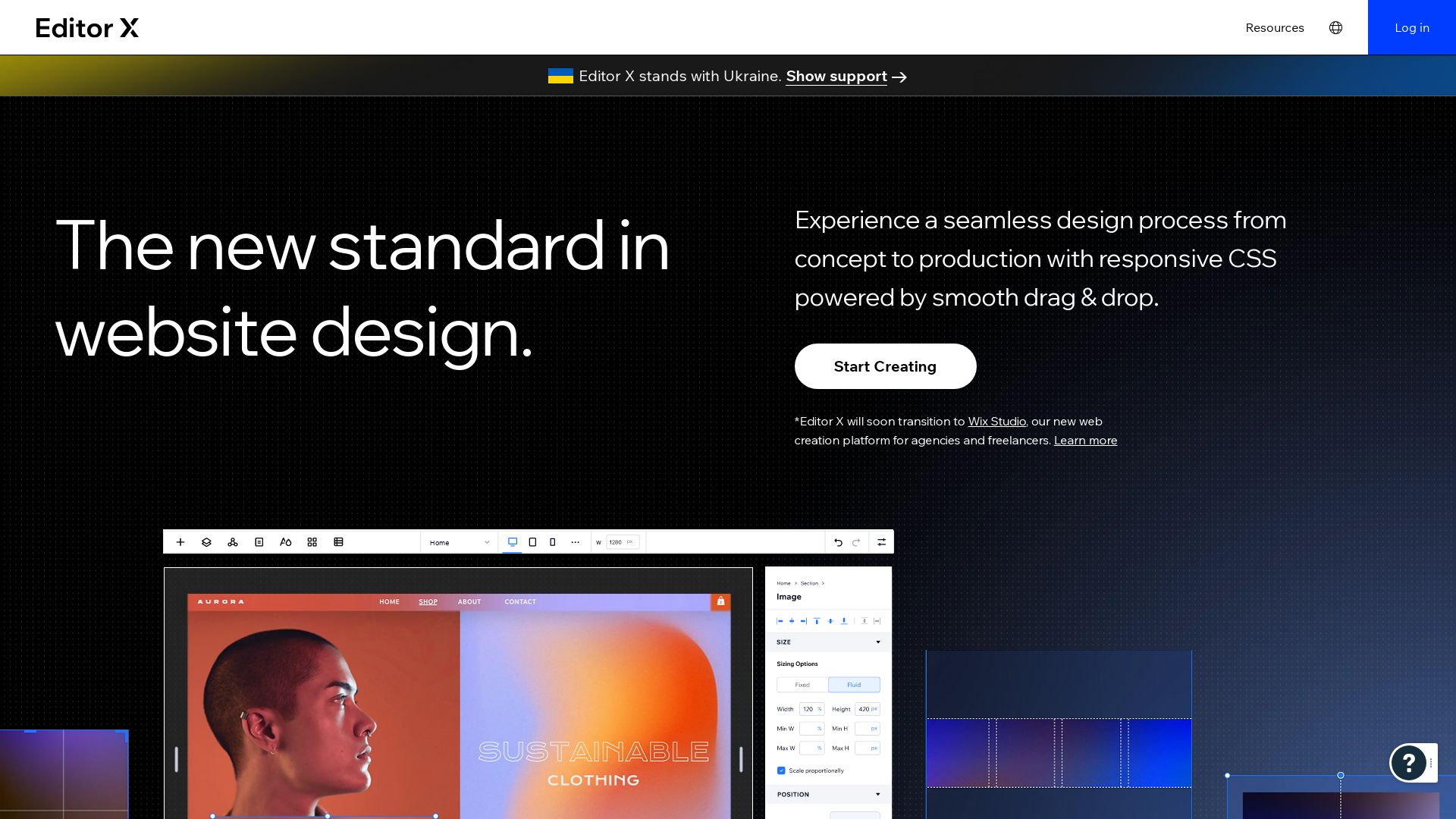
Emerging from the distinguished cradle of Wix in 2020, Editor X surfaces as a coveted and refined platform for creators, web aficionados, and entrepreneurs seeking a radiant canvas for their digital endeavors.
Editor X’s Top Features
- Customizable Website: Freedom of self-expression through unique design and responsive blueprints.
- Dynamic Collaboration Tools: Revolutionary synchronic project development and user permission adjustments.
- Coding Support: Comprehensive coding assistance, ingenious debugging options, language compatibility.
- Ecommerce Solutions: Integrated payment gateways, pliable shopping cart features, and online boutique creation.
| Security: | SSL-certified, PCI compliant, robust data encryption and tokenization. |
| Marketing & SEO: | Interconnectivity with marketing apparatus like Google Analytics, email campaign creator, SEO enhancers. |
Editor X Downsides
- For beginners, the profusion of features may seem overwhelming.
- The transition to Wix Studio might require a learning curve for existing users.
Editor X Use Cases
Entrepreneurs
Editor X, with its invoicing, lead generation, secure hosting, enables entrepreneurs to create a significant online presence.
Designers
The slate of customizable templates, complex layouts, responsive designs inspires creative exploration and visual brilliance.
Ecommerce Hosts
With its integrated payment processing and store creation, Editor X offers a seamless ecommerce setup for burgeoning online businesses.
Shopify
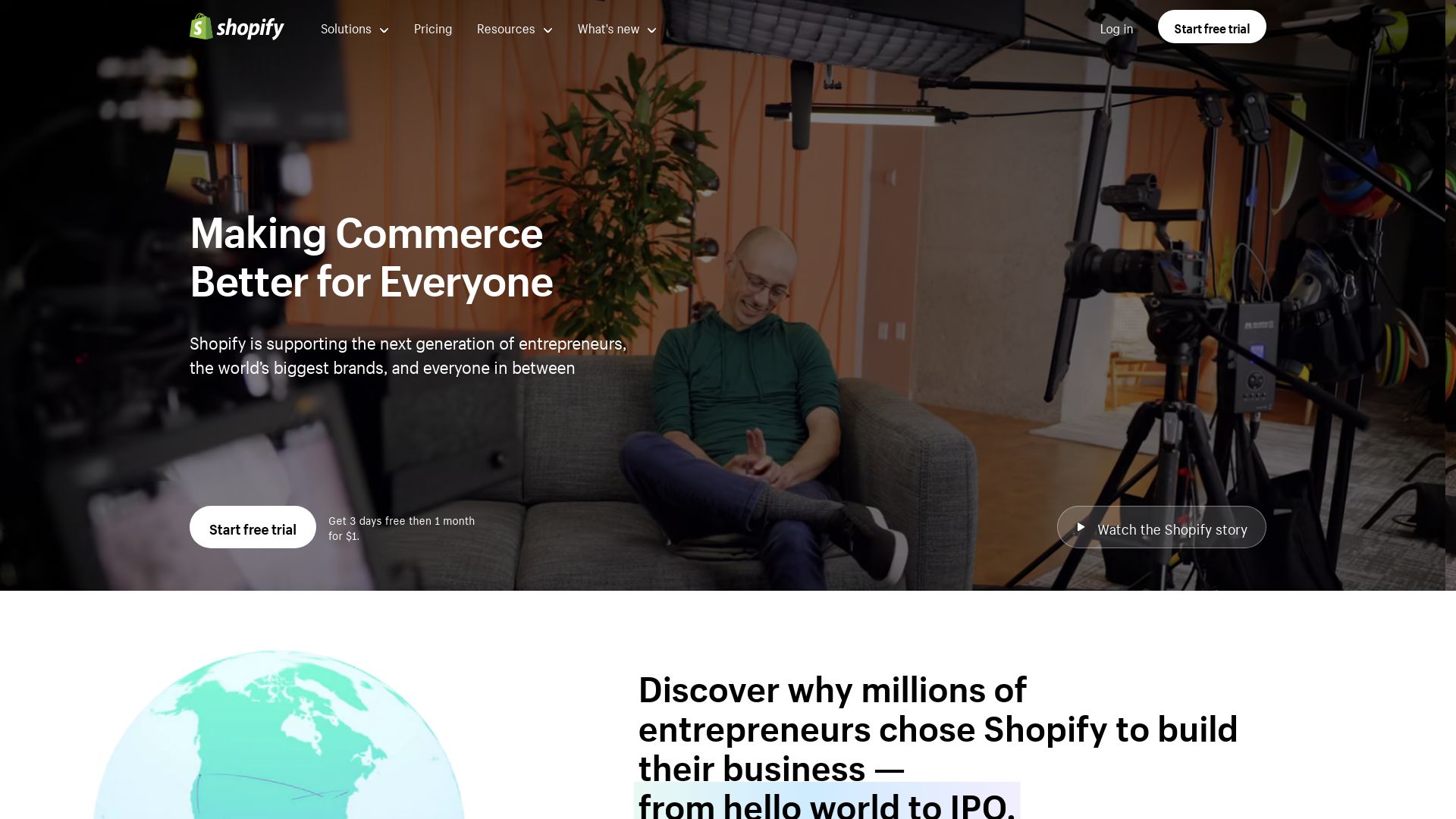
Introducing Shopify, a robust eCommerce solution providing pre-designed, cost-effective templates for eCommerce websites. Beware, it might not cater to brand-specific aesthetics, requiring additional efforts for custom design.
Shopify’s Best Features
- Cost-efficient templates, lowering the barrier for first-time eCommerce entrepreneurs.
- Capability to adopt both native and headless builds, offering flexibility and control.
- A well-structured approach to SEO, crucial to driving nearly 43% of eCommerce traffic.
- Reliable support from third-party developers and agencies like Metizsoft Solutions, Eastside Co, and Blend Commerce.
| Features | Benefits |
|---|---|
| Quick-launch solutions | Acceleration Programme by Eastside Co helps launch stores in under 4 weeks. |
| Custom Functionality & Integration | Aids in individual page aesthetics and connectivity with custom ERP or CRM systems. |
| Key engagement elements | Capabilities like search functionality, promotion and discount tools, wishlist creation, product reviews and newsletter sign-ups. |
Shopify Limitations
- No direct, in-house custom design services.
- Dependency on third-party templates or professional agencies for unique designs.
- Costly custom designs, often with extended timelines.
Shopify Pricing
Factoring in Shopify’s monthly subscription ($29 to $300), the cost of templates, and custom design expenses, expect Shopify website setup costs to lie in the range of $500 to $100,000+, depending on project complexity.
Shopify Use Cases
Use case 1
First-time online sellers: Shopify can be a boon for first-time online retailers for its inexpensive templates and easy to understand user-interface.
Use case 2
High-Integration Business: A business in need of custom ERP/CRM integrations and unique page designs can leverage Shopify’s integration potentials.
Use case 3
Growth-focused businesses: With a focussed approach to SEO, Shopify is an ideal match for enterprises prioritizing organic traffic and scaling conversions.
Grant Sullivan
Content writer @ Aircada and self proclaimed board game strategist by day, AI developer by night.



